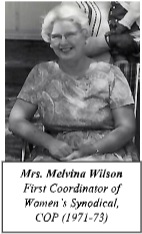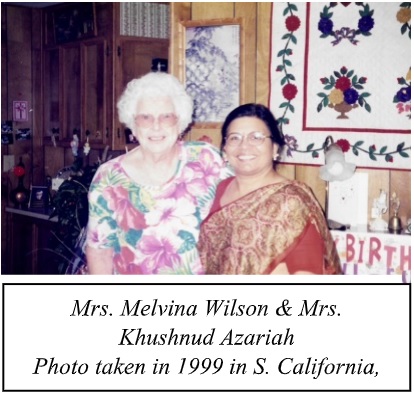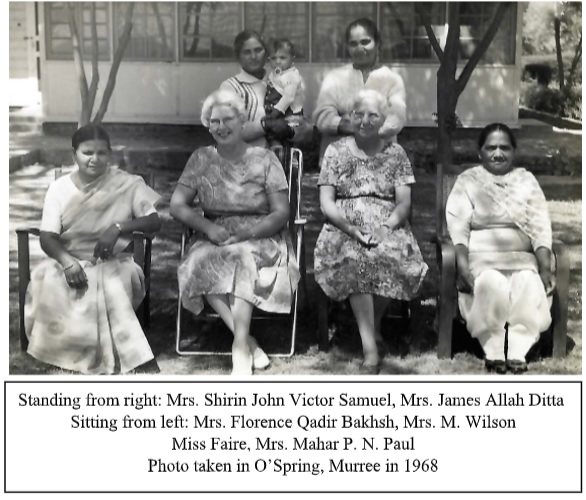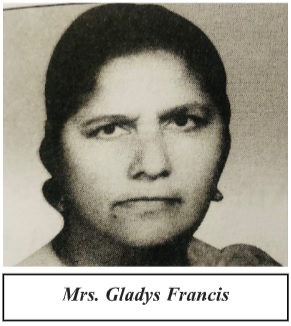A Strong and Supportive Arm of the Church (2nd Issue)
In the second issue, I will outline (i) a brief history of the Church of Pakistan, (ii) the Program Emphasis &
Concerns of Women’s Synodical during 1972-74, and (iii) introduce two strong pillars of the Synodical of Women’s
Fellowship of the Church of Pakistan, working side by side as committed staff of Women’s Synodical of the Church
of Pakistan, i.e. Mrs. Melvina Wilson, and Mrs. Gladys Francis.
Brief History of the Church of Pakistan
The Church of Pakistan(COP) is an Ecumenical Church. The four uniting churches were: (i) The United Methodist in Pakistan (Karachi and Multan Conferences); (ii) The Anglican Church in Pakistan, (Lahore and Karachi Dioceses, as well as Dacca Diocese in East Pakistan, now Bangladesh); (iii) The Scottish Presbyterians’ United Church in Pakistan (Sialkot Church Council and Rajshahi Church Council in East Pakistan); (vi) The Pakistan Lutheran Church, located largely in the North Western Frontier Province (NWFP) now known as Khyber Pakhtunkhwa (KPK).
The Inaugural ceremony of the Church of Pakistan was held on All Saints’ Day, November 1, 1970 at the Lahore Cathedral Church of the Resurrection, with Bishop John Victor Samuel presiding. The consecration of the Bishops into this new ecclesial union took place the second day on 2 nd November 1970.
The following Bishops were assigned to the following five dioceses of the newly formed church (COP):
- The Rt. Rev. Inayat Masih, formally of the Anglican Church, was consecrated as Bishop of Lahore of the Church of Pakistan, and appointed as the first Moderator of the National Church.
- The Rt. Rev. John Victor Samuel, formally of the United Methodist Church, became the Bishop of Multan, Church of Pakistan, and was appointed as the first Deputy Moderator of the Church of Pakistan.
- The Rt. Rev. James D. Blair, an English Missionary from the Oxford Mission, became the Bishop of Dacca, Church of Pakistan, which then became the Archdiocese of Bangladesh after its independence from Pakistan just a year later (1971). The resolution of independent Church was made in the Synod of the Church of Pakistan held in YMCA – Karachi in 1973.
- The Rt. Rev. Selby Norman Spence, an Anglican Missionary from New Zealand, serving in Karachi and Sindh, became the Bishop of Karachi, Church of Pakistan. Within two years of the union, he resigned and returned back to New Zealand where he was appointed as the Assistant Bishop of Auckland of the Anglican Diocese, in December 1977.
- The Rev. Arne Rudvin, a Norwegian Lutheran missionary who had been appointed the Bishop of a very small group and Church of the Lutherans in the Murdan (North West Frontier Provine)Pakistan, shortly before the formation of the United Church of Pakistan, was consecrated into the Church of Pakistan as a Bishop with no specific Diocese. He was given the title as the Assistant Bishop of Lahore. However, when Bishop Selby Spence suddenly left the Diocese of Karachi in 1973, Bishop Rudvin was appointed as the Bishop of Karachi.
- The Rt. Rev. William G. Young was a Scottish missionary belonging to the Scottish Presbyterians. Serving the Sialkot Church Council as the Moderator, he played an active role in the negotiations of the Plan of Union. In his book, “Presbyterian Bishop”, Bishop Young states that in the Spring of 1967, he was approached by Bishop Woolmer (Anglican Bishop of Lahore) to put forward his name as one of the bishops. The Negotiating Committee for Church Union in Pakistan planned to set up five dioceses, each of which would have a mix of at least two on the uniting churches. “On April 16, 1969, Rev. William Young was nominated by the Electoral College, consisting of representatives from all the uniting Churches. The Electoral College met on March 18, 1970 and elected five people to be the first bishops of the Church of Pakistan.”The other four (Inayat, Samuel, Spence, Blair) were the Bishop Designates while Rev. Young was the Bishop Elect.
Women attending the First (1971) and Second (1974) Synod of the Church of Pakistan:
- Miss Gurli Fischer, Miss H. J. Harris, Mrs. P. Peters, Mrs. G. Francis Diocese of Lahore
- Miss Shanti Moti Ram, Miss Melvina P.R. Michael Diocese of Multan
- Miss Lila Halder Diocese of Dacca
- Miss C. Val D’Eremao Diocese of Karachi
- Miss Catherine Nicol & Mrs. Ethel Khair Ullah Diocese of Sialkot
The Program Emphasis & Concerns 1972-74
The First Synodical Conference of Women’s Fellowship was held in Lahore on April 20-22, 1972. The Theme of the Conference was “Go Forward”. The first elected officers of the Women’s Synodical were Mrs. Priscillas Peters (President), Mrs. Piyari Wahab (Vice President), Mrs. E. Khair Ullah (Secretary), and Miss Moti Ram (Treasurer). The First Moderator of the COP, Bishop Innyat Masih, Bishop of Lahore (1971-74), in in his inaugural address address, challenged the Synodical women to “Go Forward”, helping the church to overcome its ‘spiritual poverty’.
The Program Emphasis & Concerns of the Synodical during the first triennial (1972-74) were: Strengthening relationships amongst the dioceses, publishing Synodical’s Newsletter, developing study material on the theme,
“Go Forward”, appointment of a full-time women’s worker, and constitutional amendments.

Mrs. Melvina Wilson came to Pakistan as a missionary from the United Methodist Church, United States of America, in 1960. She worked as an English teacher and hostel superintendent at Lucy Harrison girls high school, Lahore. Mrs. Wilson was deeply committed to women’s education and growth of the church in Pakistan. The writer was privileged to visit her in 1999 while she was residing in a retirement home in Orange County, Southern California. Mrs. Wilson at the time was 82 years old and reminisced good memories about Pakistan.
In 1967, at the Methodist Church Annual Conference, Mrs. Wilson was asked if she would assume the responsibility of a full-time leader for the development of the Women’s Society of Christian Service (WSCS) and to train leaders in the Methodist Church in Pakistan. Mrs. Wilson agreed to take up this challenging responsibility.

Her background experience as a pastor’s wife for 30 years and also her previous work with women in her own country and church (USA), provided the basis for her work and ministry in Pakistan. As soon as she resumed responsibility as the coordinator for women’s work in the Methodist Church, Mrs. Wilson organized women at the district level so that more women could be involved in leadership and training, organizing district rallies, and preparing visual materials to explain the purpose, organization and programs of women’s fellowship. All these programs were very well attended and generated a lot of interest amongst women.
In the summer of 1968, a group of capable women volunteered their time and expertise to meet together for 10 days at the O’Spring Methodist Resort in Murree Hills, to prepare and write Study material. The group produced materials on “Organization and Duties of Officers”, “Workshop Programs”, and “Duties of a Pastor’s Wife”. All this work was organized and led by Mrs. Wilson. While speaking with the writer, Mrs. Wilson fondly spoke of two books in particular. Firstly, ‘Duties of the Pastors wife’. The pastor’s wife, Mrs. Wilson reckoned, is the leading lady in our congregation, therefore, she bears much responsibility. This book was written by Mrs. Florence Qadir Bakhsh and Mrs. Mahar Patrick. N. Paul; whose husband were district superintendents. These two ladies had years of experience as coworkers with their husbands, and therefore, in Mrs. Wilson’s opinion were the best women to write this book. This book was adopted by United Bible Training Center (UBTC) in their curriculum for training the wives of seminary students. Secondly, ‘The First Program Book’ had a theme covering four years of studies. The topics suggested by Mrs. Shirin Samuel, wife of Bishop John Victor Samuel were: Year One: “Go Tell”, Year Two: “Prepare Ourselves”, Year Three: “Go Tell your Neighbor”, and Year Four: “Go Tell Our Country”.

While speaking about the results of year four Mrs. Wilson recalled
“that year Women’s Division of the Methodist Church in USA, was placing special emphasis on the women of Africa. We used their materials [ from the World Outlook, of the Methodist Women] in our workshops and local meetings. As a result, that year our Women’s Fellowship made its first commitment to a pledge of money for a mission project outside of Pakistan. We were already observing the Fellowship of the Least Coin and supporting mission projects within Pakistan. The women specified an ‘over and above’ their local and national commitments for a pastor’s wife in Africa to receive special training at a six- weeks seminar.”
Mrs. Wilson was a woman of vision. She not only concentrated on needs of local women, but encouraged and challenged them to see the world beyond the horizon. Though year four was a bad year economically due to flood and wars, Mrs. Wilson was proud to see women’s commitment and dedication to support women both at home and abroad. According to Mrs. Wilson, all pledges to local and national projects were paid in full and four hundred rupees were sent to the Fellowship of the Least Coin and rupees four hundred to the Africa project. Though Mrs. Wilson was very grateful for the many women who faithfully volunteered their help for the various workshops set up in each district, she always longed for a full-time salaried co-worker. Finally, God listened to her prayers and financial help came from Women’s Division, USA. Mrs. Gladys Francis was taken on board in 1969 to work with Mrs. Wilson as a full-time women’s worker. While speaking of Mrs. Frances, Mrs. Wilson said, “She was the most wonderful, dedicated, and talented Christian lady. We worked closely, harmoniously together for four years.”
Mrs. Wilson served the Church of Pakistan as the first coordinator of Women’s Synodical, and member of the nominations committee along with Mrs. Hoyt Smith (Synod 1971). While speaking of the enlargement of women’s work when Church Union took place, Mrs. Wilson recalled,
“We all cooperated beautifully. The other denominations wanted our workshops
and training program continued. Many more women volunteered with their skills
and time. What a rewarding experience it was to work in all these new areas, sharing ideas and talents. I retired in 1973 knowing the work was in great hands and that Mrs. Francis’s leadership and the cooperation of many willing women, dreams and vision of the future would continue.
Mrs. Wilson returned to Pakistan in 1979 for a three-month visit. She was excited to see that there was much progress even though she thought dreams had not yet materialized. She felt like Saint Paul, visiting all the churches he had nurtured. In an article, she had sent to the writer in 1996 Mrs. Wilson concludes with the following remarks:
My spirit rejoiced, yet was humbled to realize the marvelous opportunity God had given me. I praise Him for all of those who have continued to carry on His work among women, and rejoice with you [Khushnud] over the continuing results. Mrs. Qadir Bakhsh [writer’s mother] was one of the most faithful, dedicated women, originating and carrying out our vision – now her two daughters, Khushnud and Shunila are following in her first steps and enlarging that vision for the present and the future. God works in wondrous ways! Praise him!
Mrs. Gladys, Francis worked side-by-side with Mrs. Wilson. She lived most of her life in Raiwind. Gladys Daniel daughter of Pastor Daniel was born on 18th May 1920 in Ambala India. Her brother Rev. Eric N. Daniel was a well-known and respected minister of the United Methodist Church in Karachi, Pakistan. Gladys Daniel received
her early education from Ambala. She did Matriculation from Pathankot Girls High School, received Higher Secondary School Certificate (FA) from Diyo Samaj College, Ferozepur, and Bachelor of Arts (BA) from Kinnaird College for women, Lahore.
Being a daughter of a pastor, she moved with her father to different cities and village parishes, which provided her with life’s rich experiences. She accompanied her father to Raiwind where she began her career as a teacher. She taught in the Christian Institute of Raiwind from 1947 to 1969. Gladys married Mr. Alfred Lal Francis, a school master, in 1950 in Raiwind. Mr. Francis died after a long sickness in 1957. Gladys Francis was an excellent teacher, who was greatly loved and admired by her students. Her students have done exceedingly well in life and are placed well in life all over the world.

In 1969 Mrs. Francis was invited by the Methodist Church to assist Mrs. Melvina Wilson to organize women’s work in the United Methodist Church as a full-time paid staff. Mrs. Francis, reckoning it a call from God accepted this challenging task. She continued to work in the United Methodist until 1970. When the Church Union took place in 1970, Mrs. Francis with the assistance of Mrs. Wilson and many other women who had joined the newly formed Church, worked hard to develop and nurture the work of Women’s Synodical. She was the first co-opted member on the Executive Committee of the Women’s Synodical. When Mrs. Wilson left for the United States of America in 1973, Mrs. Francis continued to work in the church of Pakistan until the end of the year. Her status then changed to a full-time worker in Lahore Diocese only. At the second Synodical held at Sialkot in April 1974, it was strongly felt that she should continue to work in her previous capacity in all four dioceses of the Church of Pakistan.
Mrs. Francis played a significant role in the organizational work of Women’s Synodical of the church of Pakistan. At the invitation of various dioceses, Mrs. Francis traveled extensively within the four dioceses to establish and organize women’s fellowship groups (Rafaqat-e-Khawateen) in villages as well as in all the cities until 1985. She helped conduct a number of leadership training workshop for women, assisted in developing resource material and helped the Synodical to enlarge its vision to become an ecumenical sisterhood. She played an active role to promote the ‘Fellowship of the Least Coin’ in Pakistan. She represented women’s Synodical in various International meetings, i.e. Asian Church Women’s Conference (ACWC).
In 1985 Mrs. Francis was appointed by Bishop Michael Nazir Ali, First Bishop of Raiwind Diocese as the founding Head Mistress of Saint Mary’s Girl School in Raiwind. This was another challenge, which she accepted wholeheartedly. She continued to work in this school until her untimely death on 26 July 1998. Her dedication to the church is fondly remembered by all women, particularly Raiwind Diocese of which she was a member till her death in 1988.
Mrs. Francis was highly dedicated to her Call to educate the under privileged girls of Raiwind, and to serve Christian women of Pakistan. Though she had ample opportunities to migrate to her family members living abroad, she opted to stay in Pakistan among her own people in Raiwind. She loved her church and her people. In recognition of her long and much dedicated services, the Church women of Raiwind Diocese have placed a Baptismal Bowl in St. Mary’s Church, Raiwind. Mrs. Gladys Francis will always be remembered as a pioneer of Women’s work in the United Methodist Church in Pakistan, as well as a pioneer of Women’s Synodical of the Church of Pakistan. She has nurtured and developed leadership among many women. She was a great source of inspiration for her friends, family and fellow workers.
Read 1st Issue: The Synodical of Women’s Fellowship of the Church of Pakistan, A Strong and Supportive Arm of the Church (Historical Overview)
Share this article